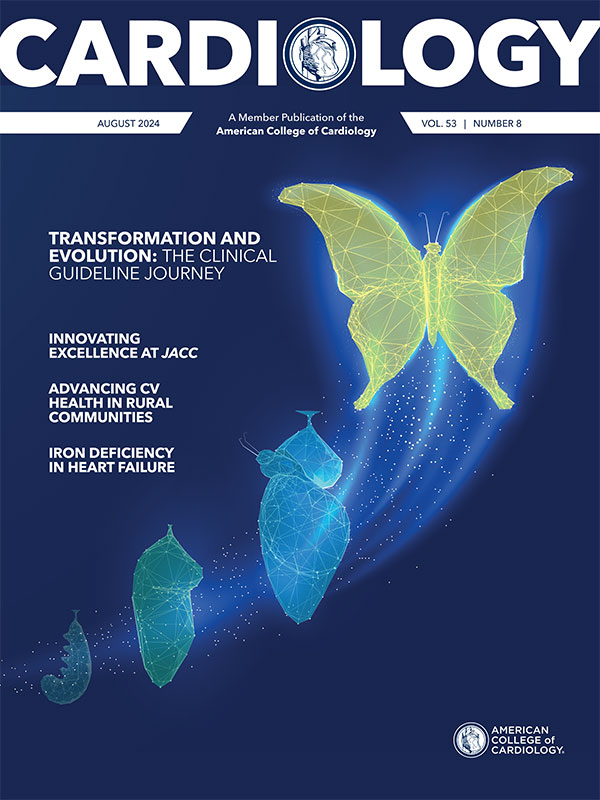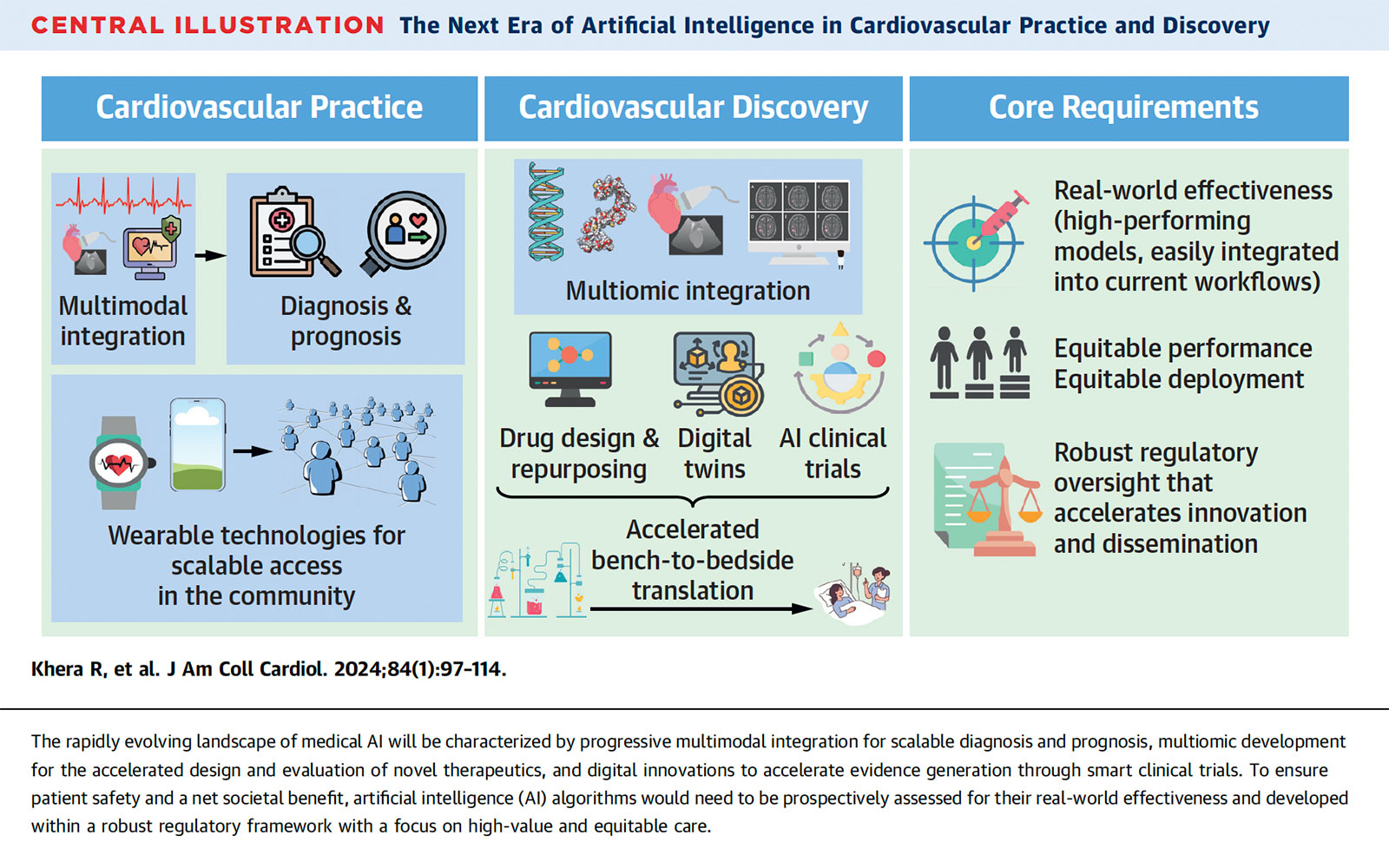JACC in a Flash | AI in Transforming CV Care; CLEAR Outcomes; More
Featured topics and Editors' Picks from all of ACC's JACC Journals.

"The exponential rise in technology powered by [artificial intelligence (AI)] is defining new frontiers in cardiovascular care, with innovations that span novel diagnostic modalities, new digital native biomarkers of disease, and high-performing tools evaluating care quality and prognosticating clinical outcomes," write Rohan Khera, MD, FACC, Eric J. Topol, MD, et al., in a JACC State-of-the-Art Review.
The review provides a comprehensive look at the current landscape of AI across clinical practice, including innovations in optimizing disease diagnosis and prognostic outcomes, such as AI-guided interpretation of ECGs to detect atrial fibrillation, valvular heart disorders and cardiomyopathies. The authors also touch on uses of AI in biomedical discovery, including for preventive screening and helping to determine disease risk – a process that has "required detailed clinical evaluation, invasive blood-based biomarkers, or risk scores."
In addition to the current landscape, the authors explore the future of AI in care delivery, including locally adapted, continually learning AI tools, AI-augmented clinical encounters, AI-enabled high-quality community care, and democratized global cardiovascular care. Other potential innovations, include highly individualized targeted therapeutic selection, and design and acceleration of evidence translation through AI-powered clinical trials.
Despite the many benefits, effectively implementing an AI-propelled future is not without its challenges, according to Khera, Topol and colleagues. Among them, the need to address data privacy and security, interoperability across health systems and communities at large, and enabling appropriate regulatory models. How to evolve evidence-generation and regulation to evaluate personalization and how to address health equity, bias and barriers to implementation are also critical questions to answer.
"Over the next decade, we envision an AI-propelled future in which the cardiovascular diagnostic and therapeutic landscape will effective leverage multimodal data at the point of care," they write. However, they caution that "the path to this future requires equitable and regulated adoption that prioritizes fairness, equity, safety, and partnerships with innovators as well as our communities and society.
Click here for an online-only piece on a JACC Series looking at AI advancements and applications in cardiovascular care delivery.
Khera R, Oikonomou EK, Nadkarni GN, et al. J Am Coll Cardiol 2024;84:97-114.

There has never been a greater opportunity nor a better moment" for greater collaboration between the U.S. Food and Drug Administration (FDA) and the cardiovascular (CV) community to improve heart health, according to a recent article published in JACC and authored by Haider J. Warraich, MD, and Robert M. Califf, MD, MACC.
Given the FDA's role as a regulatory, scientific and public health agency and the CV community's reputation as subject matter experts and a "driving force for innovation," the paper highlights several ways "society could benefit from increased engagement," particularly in the areas of evidence generation, patient-focused clinical engagement, and artificial intelligence and digital health technologies. Click here for the details.

Bempedoic acid is similar with statin therapy at decreasing the risk of a first major vascular event per every 1 mmol/L reduction in LDL-C, according to a post hoc analysis of the CLEAR Outcomes trial, published in JACC.

ESC Congress 2024 will take place in London from Aug. 30 to Sept 2. Follow JACC.org on X, Facebook, Instagram and LinkedIn for highlights from the meeting, including simultaneously published science, key trial takeaways, video interviews and more. Also check the JACC Journals ESC Congress 2024 event page for information on JACC-related sessions, author receptions and other activities. For those attending the conference, be sure to stop by the ACC booth to grab copies of JACC and learn more about the journals. Visit JACC.org/ESC2024 to learn more.

The incidence of graft failure in CABG is higher among women than men, and is associated with adverse cardiac events, according to a study published in JACC. However, researchers say the excess mortality risk in women was not mediated by graft failure.

A JACC State-of-the-Art Review explores the relationship between severe, symptomatic tricuspid regurgitation (TR) and advanced heart failure with preserved ejection fraction (HFpEF) and proposes strategies for optimizing patient care and outcomes.

Risk estimation for coronary heart disease (CHD) at the population level was not enhanced by correcting LDL-C for its content of lipoprotein(a) (Lp[a]), according to a study published in JACC.

"History reveals that major advances in medicine were launched as a result of unconventional thinking by rebellious individuals, birthed in multigenerational intellectual communities, shaped by political events, published after years of delay, and typically greeted with great resistance," writes Milton Packer, MD, FACC, in a JACC Review Article. "Young investigators must challenge the status quo; if they do not rebel, nothing will change.
The article traces the 2,500-year history of both cardiovascular research and rebellion from Galen to modern-day iconoclasts and highlights five lessons for today's cardiovascular clinical investigators. Scan the QR code to access the tips and watch a video conversation about the paper and its key takeaways between Packer and JACC Editor-in-Chief Harlan M. Krumholz, MD, SM, FACC.
Clinical Topics: Arrhythmias and Clinical EP, Cardiac Surgery, Cardiovascular Care Team, Dyslipidemia, Heart Failure and Cardiomyopathies, Invasive Cardiovascular Angiography and Intervention, Prevention, Atherosclerotic Disease (CAD/PAD), Atrial Fibrillation/Supraventricular Arrhythmias, Cardiac Surgery and Arrhythmias, Cardiac Surgery and Heart Failure, Advanced Lipid Testing, Lipid Metabolism, Nonstatins, Acute Heart Failure, Interventions and Coronary Artery Disease, Interventions and Structural Heart Disease, Hypertension
Keywords: Cardiology Magazine, ACC Publications, Artificial Intelligence, Technology, Quality of Health Care, Biomarkers, Fatty Acids, Myocardial Infarction, Coronary Disease, Coronary Artery Disease, Cholesterol, Stroke, Cardiac Rehabilitation, Coronary Artery Bypass, Mortality, Tricuspid Valve Insufficiency, Heart Failure, Atrial Fibrillation, Hypertension, Lipoprotein(a), Angina, Unstable


